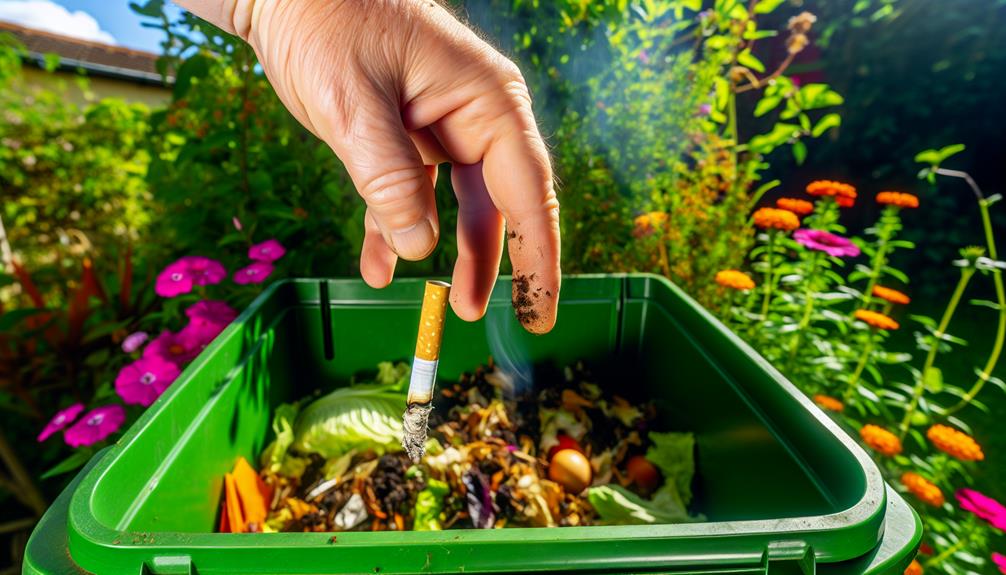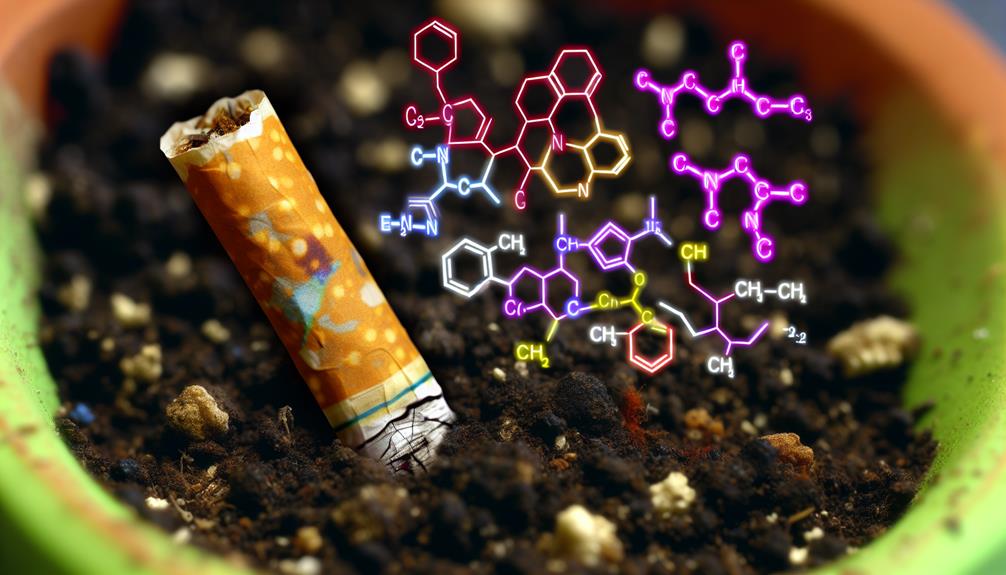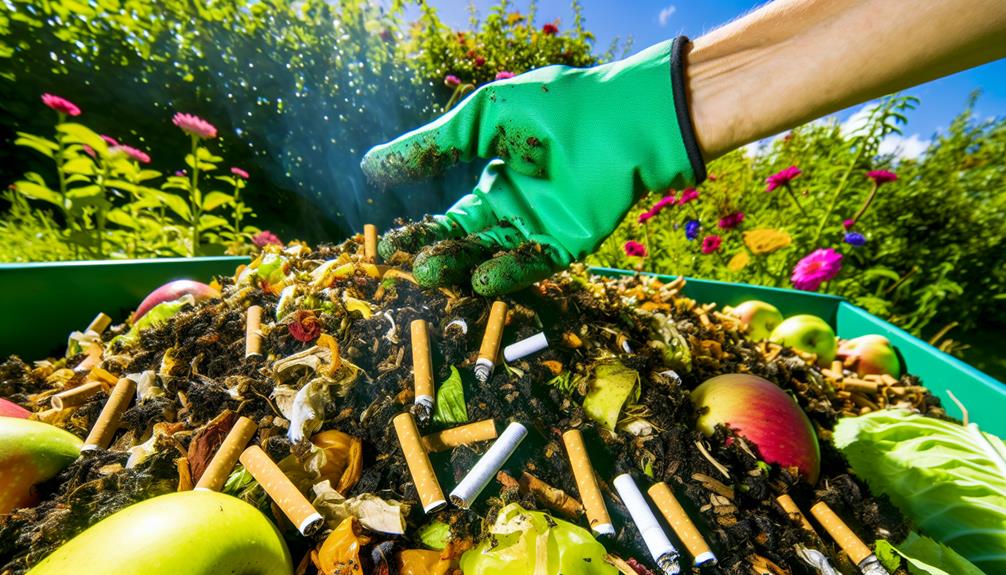

You shouldn’t compost cigarette butts because they contain plastic fibers and harmful chemicals. The filters, made from cellulose acetate, decompose very slowly and disrupt composting processes. Additionally, chemicals like nicotine and heavy metals can leach into the soil, posing environmental and health risks.
Instead, use designated disposal bins or recycling programs designed for cigarette waste. These programs help manage the waste more effectively and can reduce pollution. Proper disposal is essential for a sustainable environment. If you’re interested in innovative solutions and existing recycling programs for cigarette waste, there’s more useful information available.
Cigarette butts are made up of several components, including the filter, paper, and residual tobacco. Understanding these parts can help you make informed decisions about disposal.
The filter, a significant part of the cigarette butt, is composed of various filter materials. Most commonly, these filters are made from plastic fibers, specifically cellulose acetate. This material helps trap some of the harmful substances in the smoke, but it also presents challenges for biodegradability.
The paper surrounding the tobacco and filter is usually thin and burns away when the cigarette is smoked. However, the residual paper left on the butt, along with the small amount of leftover tobacco, remains intact. These remnants can sometimes be composted, but the plastic fibers in the filter complicate the process.
When considering composting cigarette butts, it’s important to separate the biodegradable components from those that are not. The paper and tobacco can break down under the right conditions, but the plastic fibers in the filter will persist. Knowing this, you can take steps to dispose of cigarette butts responsibly, ensuring you contribute to a more sustainable environment within your community.
The improper disposal of cigarette butts greatly harms ecosystems and contributes to widespread pollution. When you toss a cigarette butt on the ground, it doesn’t just disappear; it goes through a filtering process that releases harmful chemicals into the soil and water. This action has far-reaching consequences for the environment.
Let’s break down the impact:
Globally, cigarette butts are the most common type of litter, with global statistics showing that trillions are discarded each year. This sheer volume exacerbates their environmental impact.
By understanding these effects, you can make more informed choices about disposal. Consider using designated bins or portable ashtrays to minimize your environmental footprint. By taking small steps, you can contribute to a cleaner, healthier planet and join a community of like-minded individuals dedicated to environmental stewardship.
Let’s work together to mitigate the damage caused by improper cigarette butt disposal.
Also Read: Can You Compost Bread?
Understanding the chemical composition of cigarette butts reveals why their improper disposal is so detrimental to the environment. When you look closely, cigarette butts are more than just unsightly litter. They contain a mix of harmful substances, including nicotine content and filter fibers, that pose serious risks to ecosystems.

The nicotine content in cigarette butts is particularly concerning. Even after being smoked, these remnants still hold nicotine, a potent toxin. This chemical can leach into soil and water, affecting plants and animals. It’s not just nicotine, though. Cigarette butts also contain heavy metals like lead and cadmium, which can be equally harmful.
Filter fibers add another layer of complexity. Made primarily of cellulose acetate, these fibers are designed to trap toxic substances from the smoke. However, once discarded, they break down very slowly, releasing these trapped toxins into the environment over time. These fibers can also contribute to microplastic pollution, which has become a significant environmental issue.
You might think cigarette butts would break down quickly, but their biodegradability is shockingly poor. While most organic matter in compost can decompose within a few months, cigarette butts are a different story. They contain cellulose acetate, a type of plastic that can take years, even decades, to break down. This is a significant problem for soil microbes, which struggle to process such synthetic materials efficiently.
Consider these three points about cigarette butts and their biodegradability:
When composting cigarette butts, you need to be aware of potential risks such as toxic chemical residue, which can harm your compost.
Environmental impact concerns also arise, given that cigarette filters contain non-biodegradable components.
Additionally, there are health hazard risks if these chemicals leach into the soil and water sources.
Cigarette butts contain a cocktail of toxic chemicals that can leach into the soil and water, posing significant environmental risks. When you consider composting cigarette butts, you’re dealing with substances like nicotine, arsenic, and heavy metals that don’t just vanish. These harmful chemicals can bypass filtering mechanisms in the composting process, leaving residue that contaminates your compost and, eventually, your garden.
Residue analysis shows that cigarette butts hold onto these toxins tightly. When they break down, they release:
Given these risks, adding cigarette butts to your compost pile isn’t a safe choice. Instead, focus on materials that enhance your compost without introducing toxic residues.
By excluding cigarette butts, you make sure your compost remains a healthy, productive environment. Remember, your goal is to cultivate a garden that thrives, and avoiding toxic chemicals is an essential step in that direction.
Your community and the environment will thank you for making the responsible choice.
The environmental impact of improperly disposing of cigarette butts extends far beyond the garden, affecting entire ecosystems and communities.
You mightn’t realize it, but cigarette butts are one of the most common forms of litter. They contain plastic filters and toxic chemicals that can leach into the soil and waterways, causing significant pollution.
To help with pollution reduction, it’s vital to understand that cigarette butts don’t decompose easily.
When they end up in the water, they can harm aquatic life by releasing toxins that contaminate the water and the organisms living in it. This pollution can then move up the food chain, affecting larger animals and even humans.
Community awareness plays an important role in mitigating these environmental risks. By educating yourself and others, you can encourage proper disposal methods and even support local clean-up initiatives.
Simple actions like setting up designated cigarette disposal bins or participating in community clean-up events can make a big difference.
Frequently overlooked, the potential health hazards of cigarette butts pose serious risks to both humans and wildlife. When you consider composting cigarette butts, it’s important to understand the health effects and risk factors involved.
Cigarette butts contain toxic chemicals like nicotine, arsenic, and lead, which can leach into the soil and water.
Here’s why you should be concerned:
To belong to a community that values health and safety, it’s important to avoid composting cigarette butts. Instead, look for proper disposal methods that minimize these risk factors. Consider using designated receptacles or participating in community clean-up programs to keep our environment and health intact.
Also Read: Can You Compost Branches?
To guarantee safe disposal of cigarette butts, use designated disposal bins that are often found in public spaces.
You can also participate in recycling programs that specialize in processing cigarette waste.
These methods help reduce environmental impact and promote cleaner surroundings.
Designated disposal bins for cigarette butts offer a vital and ensure method for managing this type of waste. They play an essential role in enhancing public awareness and contribute positively to urban design. By installing these bins in strategic locations, you can help reduce litter and promote a cleaner environment.
To make the most of designated disposal bins, consider the following steps:
Many cities now offer recycling programs specifically designed to safely dispose of cigarette butts. By participating in these municipal programs, you can help reduce the environmental impact of cigarette waste. These programs often involve collecting cigarette butts and sending them to specialized facilities where they’re processed and recycled into new products.
You’ll find that community initiatives play a significant role in making these programs successful. Local organizations and volunteer groups often partner with municipalities to set up collection points and educate the public about proper disposal methods. By getting involved, you can contribute to your community’s efforts to maintain a cleaner environment.
To participate, start by checking if your city or town has a cigarette butt recycling program. Look for information on your local government’s website or contact your waste management department. Some cities provide special containers for cigarette butts in public spaces, so be sure to use them.
If your area doesn’t yet have a program, consider advocating for one. Engage with community leaders and express the need for such an initiative. Working together, you can help establish a program that benefits everyone and promotes a sense of collective responsibility for a cleaner, healthier environment.
Also Read: Can You Compost Ash?
Various organizations around the globe are tackling cigarette waste through innovative composting programs. You can get involved in several community initiatives designed to reduce the environmental impact of cigarette butts. These projects often include educational programs that teach the importance of proper disposal and the benefits of composting.

Here are three ways communities are making a difference:
Building on these community efforts, innovative solutions are emerging to tackle cigarette waste more effectively. One promising development involves creating biodegradable filter materials to replace traditional ones made from cellulose acetate. These new filters can break down more easily in the environment, reducing the long-term impact of discarded cigarette butts.
You can also find initiatives that involve recycling cellulose acetate from cigarette filters. By collecting and treating these materials, companies transform them into useful products like plastic pellets, which can then be used in manufacturing various goods. This recycling process not only reduces waste but also creates a circular economy, benefiting both the environment and the industry.
Another innovative approach involves using specialized enzymes to break down the toxic components within cigarette butts. These enzymes target harmful chemicals, rendering the waste safer for composting and reducing its environmental footprint.
You can support these efforts by participating in local recycling programs or advocating for the adoption of biodegradable filters.
To effectively combat cigarette waste, prioritize using biodegradable filters and participate in local recycling programs. These steps make a significant difference in reducing environmental damage.
For those looking into composting alternatives, consider the following recommendations:
Disposal education is important. Understanding the impact of cigarette butts and how to manage them responsibly helps create a cleaner environment.
Yes, you can recycle cigarette butts! Some companies specialize in recycling processes that extract filter materials. By participating, you’re helping the environment and joining a community dedicated to sustainable living. Let’s make a difference together!
You’re probably wondering about the decomposition duration of cigarette butts. In landfills, they can take up to 10 years or more to break down, greatly contributing to landfill impact and environmental pollution.
Yes, you can join the TerraCycle program for specialized recycling of cigarette butts. You’ll be part of a community dedicated to reducing waste and making a positive environmental impact. Join today and contribute to a cleaner planet!
Improper disposal of cigarette butts leads to environmental pollution and wildlife harm. You contribute to water contamination and endanger animals. Let’s work together to find better solutions and protect our environment and its inhabitants.
You can repurpose cigarette butts for creative art projects or even transform them into insulation materials. By doing this, you’re not only reducing waste but also contributing positively to your community’s environmental efforts.
You shouldn’t compost cigarette butts due to their toxic chemicals and slow biodegradability.
Instead, explore safe disposal methods like specialized recycling programs or designated disposal bins.
By avoiding composting cigarette butts, you protect your compost and the environment from harmful contaminants.
Consider supporting innovative solutions that aim to recycle or neutralize these pollutants.
Always prioritize safe, responsible disposal to minimize environmental impact and promote a cleaner, healthier planet.
